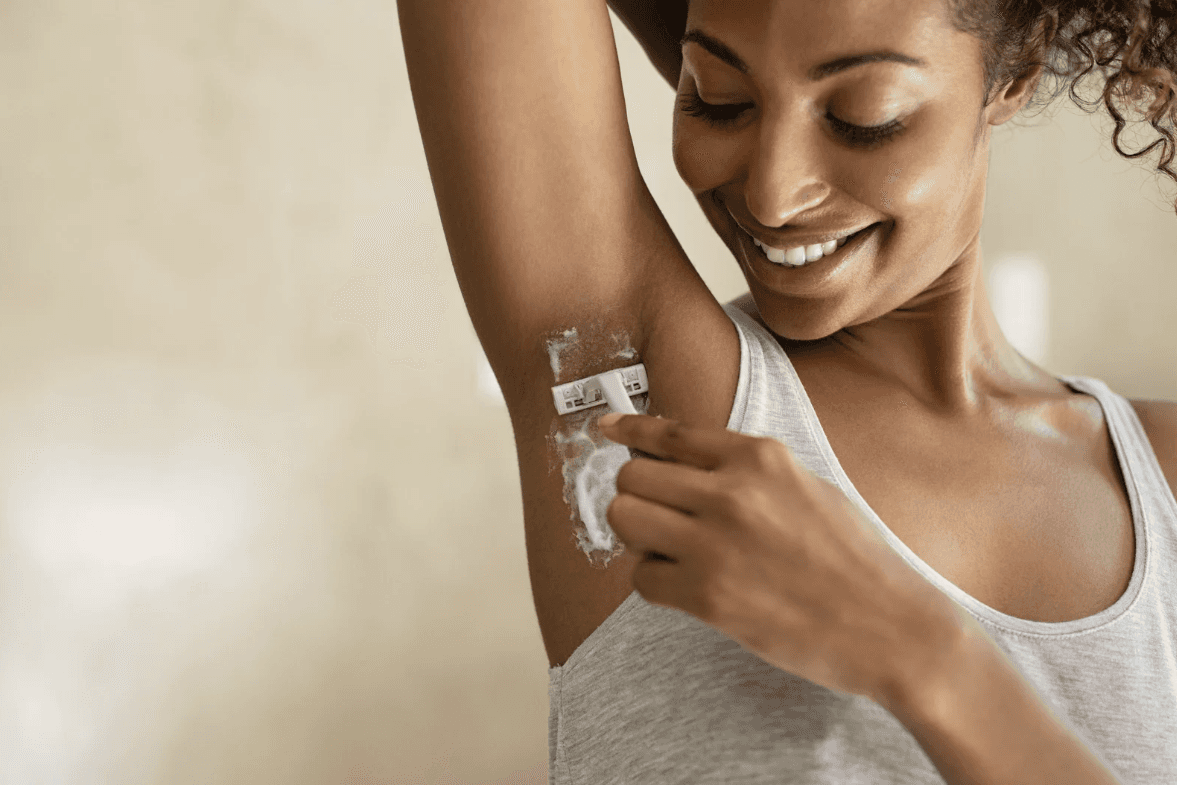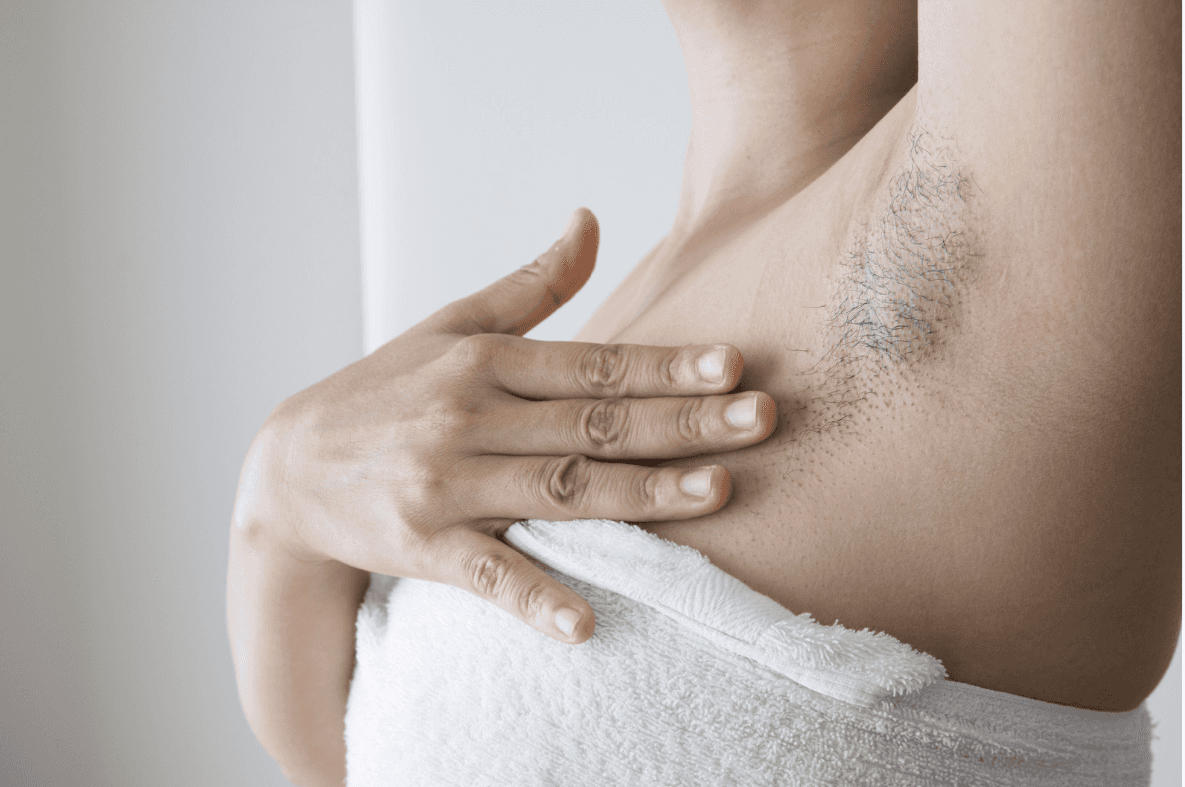Armpit hair often gets a bad rap—it’s stigmatized, politicized, and blamed for body odor—but does armpit hair actually cause sweat? The short answer is, no. Armpit hair doesn’t make you sweat more, but it can influence the effects of armpit sweat on your day-to-day. Armpit hair can make odor more noticeable, sweat stains more pronounced, and hinder sweat evaporation. So, while only your body’s sweat glands determine how much you perspire, your armpit hair can have an impact on how that sweat affects your daily life.
Does Armpit Hair Cause Sweat?
Does armpit hair cause sweat? Explore how armpit hair impacts sweating, odor, and daily life, plus tips for managing underarm sweat.
Dec 9, 2024
Written by
Abbi Havens
Armpit Hair and Sweat: What’s the Connection?
Sweating is your body’s natural cooling system. When your body temperature rises, your brain signals your sweat glands to produce sweat. Sweat then evaporates from the surface of your skin, cooling your body through a process called heat of vaporization.
There are two types of sweat glands: eccrine and apocrine. While eccrine sweat glands are spread throughout your body, apocrine sweat glands are concentrated in areas like the armpits. These glands produce a thicker, protein-rich sweat that bacteria feed on, creating body odor.
Hyperhidrosis, and more specifically, axillary hyperhidrosis, is a medical condition characterized by excessive underarm sweating. For those affected, managing underarm sweat can be a constant battle, impacting social, emotional, and professional wellbeing.
Why Do We Have Armpit Hair?
Armpit hair may seem like an inconvenience, but it serves a purpose. It likely evolved to reduce skin friction during movement and to help disperse pheromones—chemicals thought to play a role in attraction. However, these benefits may not always outweigh the challenges armpit hair can pose for sweat and odor management in modern life.
Can Armpit Hair Cause Odor?
As mentioned, armpit hair itself doesn’t create odor. However, it can trap sweat and bacteria, amplifying the smell. More hair means more surface area for bacteria to thrive, which is why odor can seem worse when armpit hair is left unchecked.
Should I shave my armpits?

Whether or not to shave your armpits is a personal choice. For people perceived as women, the expectation of smooth underarms is thought to have stemmed from the popularization of sleeveless tops in the 1920s. Companies like Gillette seized the opportunity to market razors to women, and the rest is history. Since shaved underarms became the norm for many, the state of others’ underarms has been a regular topic of conversation (if a celebrity reveals underarm hair with a red carpet look, you can bet you’ll hear about it). Our opinion? Whoever you are, do what makes you comfortable.
If you struggle with body odor, shaving can potentially reduce odor by removing the hair that traps sweat and bacteria, but it’s not a requirement for pits that smell nice. Continue reading for strategies to help you manage odor and sweat, with or without hair.
How to Reduce Armpit Sweat
Whether you have smooth underarms or underarm hair, axillary hyperhidrosis is a treatable condition. A combination of simple lifestyle adjustments and medical treatments can effectively reduce excessive armpit sweating.
Healthy Lifestyle Changes
Through simple updates to your routine, you can take the first step to managing excessive underarm sweating:
Eat a healthy diet: Certain foods and beverages including spicy foods, processed foods, caffeine, and alcohol can exacerbate sweating. Consider cutting back on these items and focusing on a healthy, whole-foods diet.
Choose the right fabrics: Breathable fabrics like cotton, linen, and bamboo allow air to circulate, keeping your underarms drier. Moisture-wicking fabrics are designed to pull sweat away from the skin and dry quickly, and can be especially helpful for workouts and warm weather.
Use Antiperspirants: Although antiperspirants don’t work for everyone with hyperhidrosis, consider trying clinical-strength antiperspirants. For best results, apply the product at night—your sweat glands are less active, which allows the product to better absorb and block sweat production by morning.
Medical treatments
Axillary hyperhidrosis is a treatable medical condition. The following treatments can significantly reduce excessive underarm sweating and improve your quality of life:
Glycopyrrolate: Glycopyrrolate is a medication that can be taken orally or topically and effectively reduces sweat production by blocking nerve signals to sweat glands.
Botox: Botox injections are commonly used to treat excessive armpit sweating, and work by temporarily blocking the chemical signals that stimulate sweat production. Treatments are long-lasting (4-12) months.
Prescription-strength antiperspirants: Prescription-strength antiperspirants prescribed by a healthcare provider are often recommended for moderate to severe sweating and are more effective than over-the-counter (OTC) antiperspirants.
Surgery: A surgery called endoscopic thoracic sympathectomy (ETS) may be an option in cases of severe hyperhidrosis. This procedure involves cutting or clamping the nerves that stimulate sweat glands.
How to Reduce Armpit Odor
Managing armpit odor effectively requires a combination of proper hygiene and products. Here are three strategies to keep odor under control:
Use antibacterial washes: Odor is caused by bacteria breaking down the proteins in your sweat. Using antibacterial soaps or washes, like those containing chlorhexidine or benzoyl peroxide, can significantly reduce the bacteria in your armpits. For best results, apply the wash to dry skin before showering, leave it on for a few minutes, and then rinse it off. This method can create a cleaner slate for deodorants to work more effectively.
Apply odor-neutralizing products: Incorporate deodorants and sprays designed to neutralize or mask odor into your daily routine. Look for products that contain baking soda, activated charcoal, or magnesium hydroxide, as these ingredients can help absorb moisture and neutralize odors. Some deodorants also include natural antibacterial agents, like tea tree oil or witch hazel, to tackle the root cause of odor. If you experience skin irritation, look for products labeled “fragrance free”.
Try probiotic products: Probiotic armpit products are an emerging solution that works by balancing the microbiome in your underarms. While more research is needed on these products and they yield mixed results, the idea behind probiotic deodorant is to introduce good bacteria to help outcompete odor-causing bacteria. Pairing this with regular exfoliation may further prevent the buildup of dead skin and bacteria.
Closing Thoughts
Armpit hair doesn’t cause sweat, but it can impact how sweat and odor affect your daily routine. Body hair is a personal choice, and whether you choose to shave or embrace your natural hair, there are plenty of ways to reduce sweat and odor—from at-home remedies like antiperspirants and breathable fabrics to medical treatments like glycopyrrolate. Ready to tackle excessive underarm sweat? Schedule an online consultation with a SweatRx provider today.
References
Cleveland Clinic medical. (2024a, October 21). Body odor: Causes, changes, underlying diseases & treatment. Cleveland Clinic. https://my.clevelandclinic.org/health/symptoms/17865-body-odor
Cleveland Clinic medical. (2024b, October 21). Why do we sweat?. Cleveland Clinic. https://my.clevelandclinic.org/health/body/sweat
Edwards, P. (2015, May 22). How the beauty industry convinced women to shave their legs. Vox. https://www.vox.com/2015/5/22/8640457/leg-shaving-history
Fecht, S. (2017, July 3). Do probiotic deodorants really work?. Popular Science. https://www.popsci.com/do-probiotic-deodorants-really-work/#:~:text=The%20types%20of%20bacteria%20matter,very%20temporary%2C%E2%80%9D%20says%20Callewaert.
Kester, S. (2020, February 28). Why do we have armpit hair? and other body hair answers. Healthline. https://www.healthline.com/health/why-do-we-have-armpit-hair
Limone, S. S. (2024, January 8). Sweating after eating: Causes & foods that trigger it. SweatBlock. https://www.sweatblock.com/sweating-after-eating/



